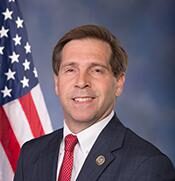
WASHINGTON — Rep. Chuck Fleischmann (R-Tenn.), chair of the energy and water appropriations subcommittee, told the Exchange Monitor Tuesday that he put “unique and robust funding” for nuclear power in the House budget proposal that passed that evening.
“If you take a look at the energy and water bill, which I wrote for the House and we passed out of committee and is ready for conference with the Senate, you’re going to see a very strong emphasis on the things you saw in there [in the House’s budget proposal], the NNSA [National Nuclear Security Administration] but also a very unique and robust funding of all the new nuclear initiatives,” Fleischmann told the Monitor in the halls of the Capitol Tuesday shortly after he said he exited the Speaker’s office.
Fleischmann specifically shouted out his funding of Generation 3 and 4 nuclear reactors on the civilian side, which he said he wants to give $8.9 billion to the Senate’s $775 million.
A government shutdown looms if the two chambers cannot reconcile their bills and pass a budget, or move forward with another continuing resolution, by March 14.
“It is our hope that we can get this in the posture to negotiate with the Senate but that’s yet to be seen,” Fleischmann added. “We may end up, and I am not for this, but we may end up in a CR [continuing resolution].”
Fleischmann, who gave remarks at an event on Capitol Hill Tuesday just hours prior to the budget’s passage on the floor, also said in remarks that he was collaborating with House Speaker Mike Johnson (R-La.) and “working very hard to get to a point where we could actually have a budget negotiation with the Senate that could get enough votes in the House, in the Senate, and be signed into law by the president.”
Meanwhile, Senate Republicans told reporters Wednesday that House speaker Johnson’s budget proposal, which narrowly passed 217-215 on the House floor Tuesday, would not be accepted as-is in the Senate.
According to Politico, Senate Majority Leader John Thune (R-S.D.) said in a closed-door lunch with Senators that while not starting from scratch, there would need to be changes to the House budget, which would be “a first step in what will be a long process, and certainly not an easy one.”
Senate Republicans reportedly also said they are willing to switch to the one-bill approach to compromise, but there is still much to negotiate on with the House regarding President Donald Trump’s agenda regarding defense, energy, border security and the tax code.
The House’s party-line passage, which included $100 billion toward defense, followed uncertainty in the House over Republican holdouts who sought deeper spending cuts, to include GOP leadership pulling the measure and then immediately putting it back on the floor when the necessary votes had been secured.
The Senate passed its own budget resolution along party lines on Feb. 21, which supports a two-step approach to reconciliation that would start with a defense-border security-energy bill, to include $150 billion defense, before taking on a second measure focused on tax and spending cuts.
President Trump last week endorsed the House’s proposal which takes a one-bill, all-encompassing approach that supports $300 billion in total new spending related to defense and border security priorities and includes a $4 trillion debt limit increase and an extension of the 2017 tax cuts instituted by the first Trump term.
The reconciliation process would allow the Senate, when the bill gets there, to pass billions of dollars in budget-related Trump administration priorities without requiring the 60-vote threshold needed to break the filibuster, while the House will require a near-unified GOP caucus to support the measure facing likely unanimous Democratic opposition.
The House and Senate’s competing budget resolutions both don’t provide a specific breakdown of how the additional funds should be spent over the four years covered by the pending reconciliation bill, tasking committees to determine how the spending would be authorized.
Exchange Monitor affiliate Defense Daily contributed to this article.